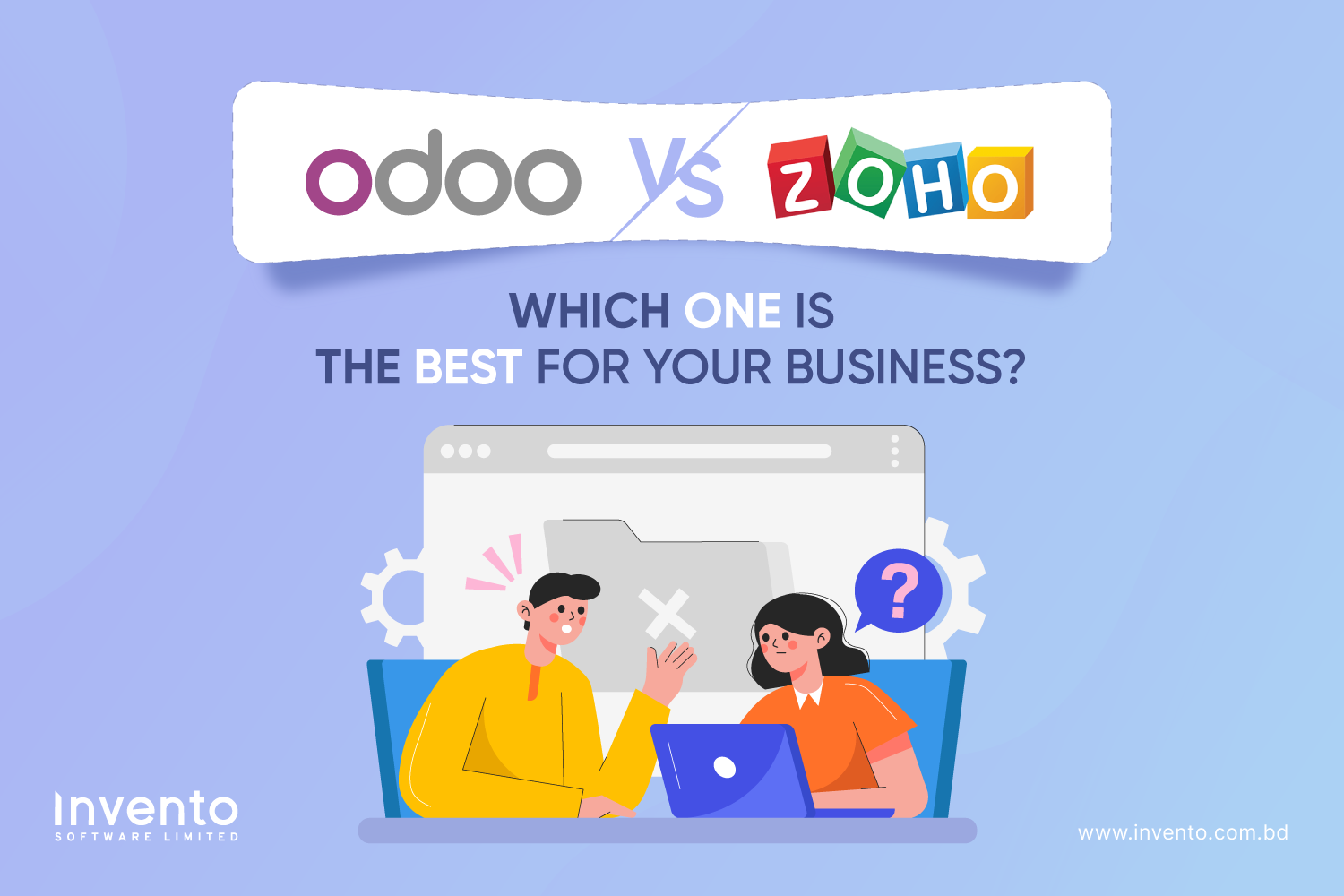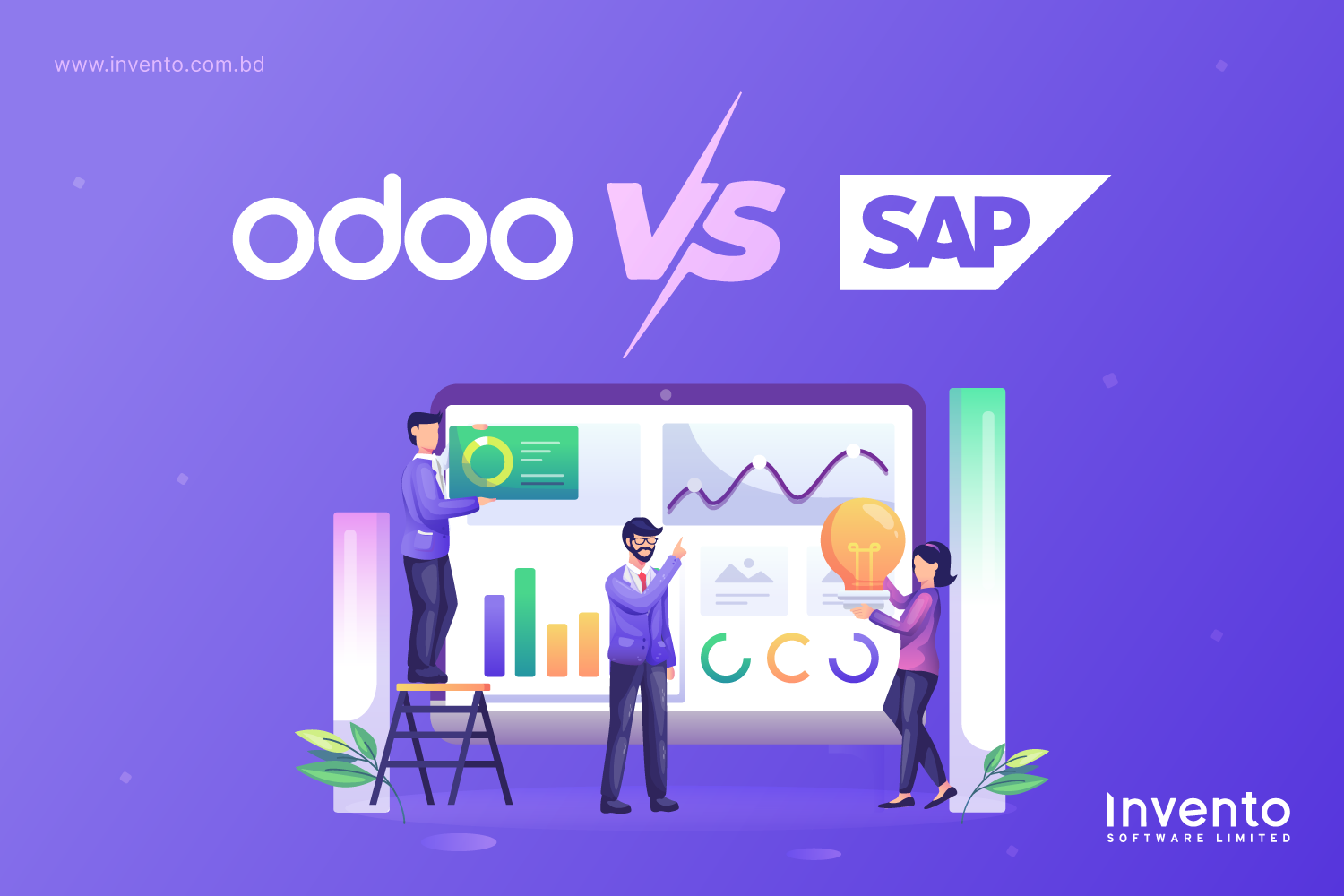In today’s fast-paced business environment, choosing the right business software is a true game-changer for business leaders. The right platform streamlines operations, boosts productivity, improves collaboration, and even saves significant costs. Among the many options available, Odoo and Zoho are two of the most popular all-in-one solutions, each designed to handle everything from CRM and accounting to HR, inventory, and marketing. Each of them has unique strengths that cater to different business needs. For business leaders, the challenge lies in choosing a solution that aligns perfectly with your workflow, budget, team size, and growth strategy. In this guide, we’re going to help you navigate the Odoo vs Zoho debate with ease. We’ll be highlighting their key differences, advantages, and practical implications for your business. By the end, you’ll have a clear picture of which platform can best support your goals. Ready to go?
What Are Odoo and Zoho?
Odoo is an open-source ERP solution which basically offers a suite of integrated modules (CRM, inventory, accounting, manufacturing, e-commerce, and more). It’s normally available in two editions: the Community Edition (free and open-source) and the Enterprise Edition (paid, with added features and support). It also offers both cloud-hosted and on-premise deployment options, with no doubt.
On the other side, Zoho is a comprehensive cloud-based suite of over 45 interconnected apps like CRM, finance, HR, marketing, collaboration tools, and more. But this is offered on a subscription basis.
Before deciding which software is the right for your business, it’s really important to understand what each platform exactly offers.
Odoo now comes in two editions:
- Community Edition – free and open-source, ideal for startups or businesses that want to customize their own system.
- Enterprise Edition – paid, with additional features, support, and professional services.
Unlike Odoo, Zoho has an exclusive focus on a subscription basis. Also it’s cloud-only, which makes setup quick but less flexible for businesses with specific data or security requirements.
So, in simple terms, Odoo is like building your own system brick by brick, while Zoho is more like buying a ready-made toolkit.
Now let’s explore the other features of Odoo and Zoho for a better understanding. Hopefully, you’ll get a clear overview of Odoo vs Zoho and be able to make the right decision.
Modularity and Customization
One of Odoo’s biggest advantages is its modular design. This means that you don’t really have to, like, install everything at once. You can just start with only the modules your business needs, such as CRM or Accounting. You can also add more when as your business grows.
Odoo: You can customize almost anything. For example, if your sales process requires multiple approval steps, you can create a workflow specifically for your team. You can also build custom reports, dashboards, and even entire modules tailored to your unique business needs. Because it is open-source, developers can add new features without waiting for official updates. Isn’t that really great?
Zoho: While Zoho allows you the very basic customization. You can add custom fields, modify forms, and automate simple workflows. However, complex changes, such as creating new modules or heavily adjusting workflows, are limited. Zoho works best if your business processes are standard. And when you don’t need unique configurations.
If you’re still confused between Odoo and Zoho, then our further discussion will help you to make you clear.
Integration Ecosystem
Integrations connect your software with other tools so you don’t waste time manually transferring data.
Odoo: Offers thousands of ready-made apps and supports integrations through APIs. You can connect with tools like Shopify for e-commerce, Mailchimp for email marketing, Google Workspace, or payment gateways. This means your sales, inventory, accounting, and marketing can all work together automatically.
Zoho: May integrate well within its own suite. Apps like Zoho CRM, Zoho Books, and Zoho Projects work seamlessly together. Zoho also allows integrations with other apps through Zoho Flow, but it is more limited when you want to connect niche or specialized tools outside the Zoho ecosystem.
You may ask why this even matters. The answer is simple. For your business, you might need multiple tools’ connections. Here, Odoo is perfectly fine if your business uses multiple software tools and wants them all connected.
Deployment: Cloud, On-Premise, or Hybrid
Where your software runs affects speed, security, and control.
Odoo: Offers three deployment options, giving businesses full flexibility:
- Cloud Hosting: Odoo is hosted on servers managed by Odoo or third-party providers. You can access it anywhere with an internet connection. Updates are automatic, so your system is always up to date.
- On-Premise Hosting: You can just install Odoo on your own servers. This gives the complete control over your data and security. It’s ideal for businesses with strict compliance rules or sensitive information.
- Hybrid: Combines cloud convenience with on-premise security. For example, core financial data can be stored on your server, while sales and marketing apps run in the cloud.
Zoho: Works only on the cloud. It’s super easy to set up and access, with automatic updates. However, you cannot host it on your own server. If your business has any strict compliance requirements, this can be a limitation.
From the discussion, it’s clear that Odoo adapts to your business needs and IT policies, giving you the complete freedom and control. Zoho is simple but less flexible.
Pricing (Odoo vs Zoho) – Which One Saves You More?
Odoo: Pay for the modules you use. Example: If you only need CRM + Accounting, you don’t have to pay for HR or Marketing. Odoo is the smart choice for any small to medium-sized business as it’s cheaper than any other tool.
Zoho One: One bundle price (~$37–45 per user/month) for everything. Good value if you’ll use multiple apps. But it can be more expensive than Odoo. You may also pay for apps your business doesn’t really use.
AI & Automation
Automation and AI can save time and improve your business efficiency.
Odoo: If we talk about Odoo, then we’ll see that it offers Copilot and workflow automation. For example, it can automatically generate invoices after a sale, send payment reminders, or even track stock levels. Businesses can also create custom automation rules for industry-specific processes, like multi-stage approvals in manufacturing or customized sales funnels. It works for customized or your exact needs. Sounds super cool?
Zoho: On the other hand, Zoho uses Zia AI to analyze sales trends, predict leads, and suggest workflow improvements. While helpful, it is mostly limited to the standard Zoho apps and predefined processes. So Zoho basically works for common and general tasks.
Support & Community
Support typically determines how quickly problems are solved and how easily you can expand your system.
Odoo: Odoo has a large global open-source community, plus certified partners and developers worldwide. You can find ready-made modules, hire experts for custom solutions, or get community advice. This makes scaling and customization easier.
Zoho: Zoho offers customer support for its apps only. The help is good for troubleshooting standard issues, but support for complex customization or niche requirements is very limited. It shows that Zoho is good for simple, out-of-the-box usage.
Here’s a comparison table between Odoo vs Zoho below for a quick overview:
| Feature | Odoo | Zoho |
| Customization | Highly customizable (open-source, modular apps, endless flexibility) | Limited customization (mostly no-code, within fixed options) |
| Deployment Options | Cloud + On-Premise + Hybrid | Cloud only |
| Industry Fit | Works for all industries (manufacturing, trading, retail, services, etc.) | Best for service-based and office businesses |
| Pricing | Pay per module → cost-effective as you grow | Pay per user for all apps → can get expensive |
| Scalability | Scales from small startups to large enterprises | Great for small businesses, but limited for complex operations |
| Ecosystem | Open-source community + 30,000+ apps | Limited to Zoho apps and integrations |
| AI & Automation | Odoo Copilot + configurable automation | Zia AI + strong built-in automation |
| Support | Global community + certified partners | Direct Zoho support |
| Best For | Businesses that want flexibility, control, and growth | Businesses that want quick, simple, ready-to-use tools |
Final Verdict
You’re probably now clear on the debate between Odoo vs Zoho ERP. Choosing the right ERP or business management software can make a big difference in how efficiently your business runs. While both Odoo and Zoho offer powerful features, Odoo clearly stands out for businesses that want flexibility, scalability, and full control.
From customizable workflows and industry-specific modules to robust integrations, AI-driven automation, and flexible deployment options, Odoo is truly designed to grow with your business. Whether you’re a startup, an SME, or a large enterprise, Odoo provides the original tools you genuinely need.
Now if you’re ready to take your business to the next level, Invento Software Limited can help you implement Odoo seamlessly. Our team of experts ensures that Odoo is tailored to your unique needs and helps you get the maximum return on your investment.







